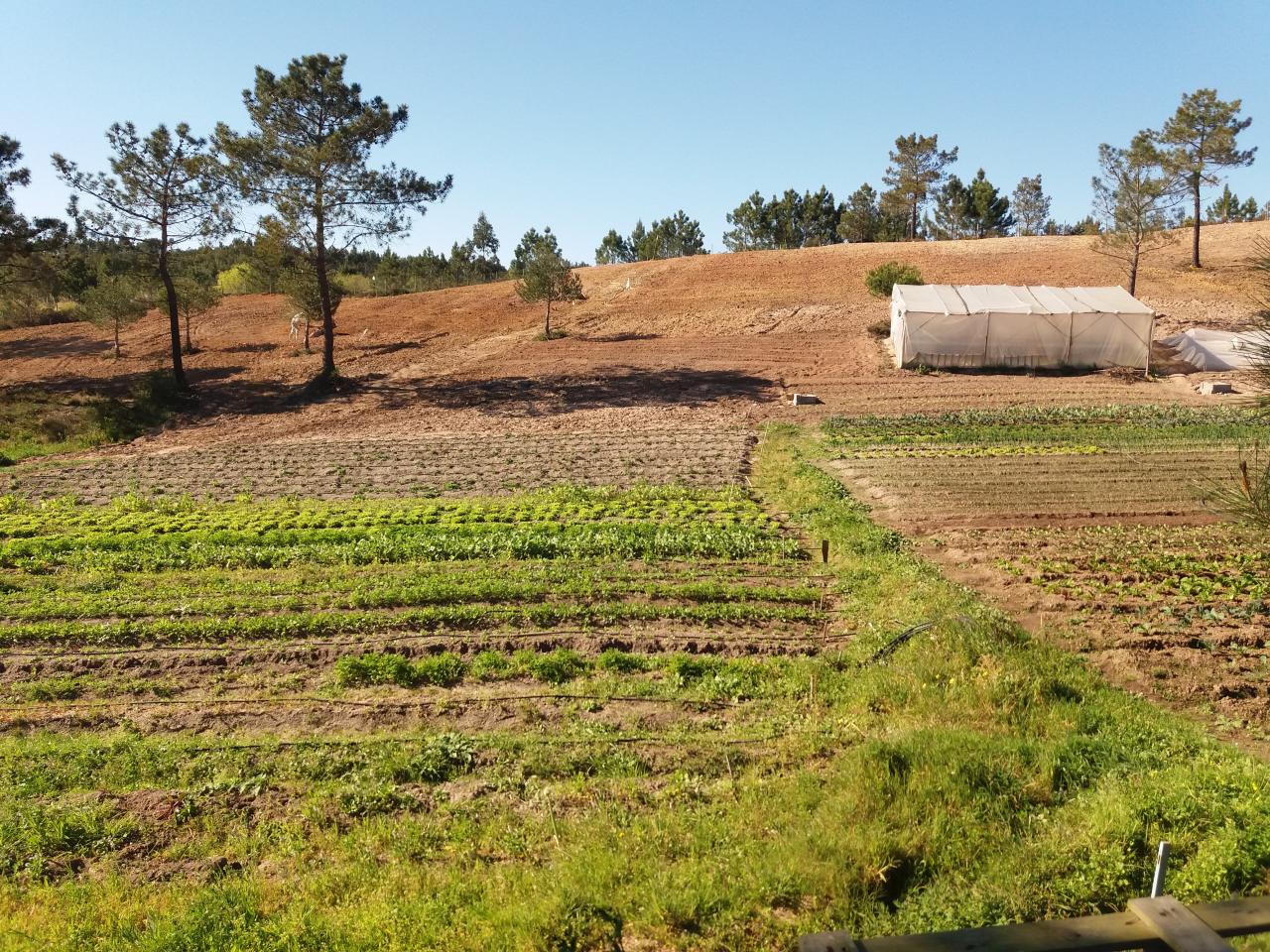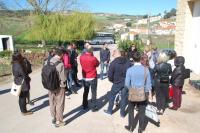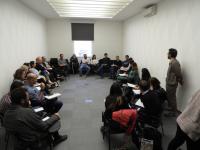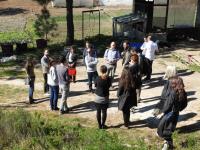
The 2nd Meeting of the BioCanteens Transfer Network took place in Torres Vedras, from 19 to 21 March, under the theme "Supply and Demand of Organic Products". The meeting gathered the seven project partners of this European project such as local stakeholders.
The 2nd Meeting of the BioCanteens Transfer Network took place in Torres Vedras, from 19 to 21 March, under the theme "Supply and Demand of Organic Products". The meeting gathered the seven project partners of this European project such as local stakeholders.
A long term commitment:
The participation of Torres Vedras into this European project was based on the Sustainable Food School Program, a local program developed since 2014 by the Municipality, which (1) promotes direct contact to the food production through school organic vegetable gardens, awareness actions and study visits to organic farms; (2) the acquisition of raw materials for school meals’ from local production, allowing the circular food economy, job creation and reduction of the ecological footprint; (3) the direct confection by the municipal kitchens in a partnership with a Private Social Institutions network for the daily school meals, according to the metabolic needs of the pupils, promoting the reduction of food waste; (4) and the consumption and healthy habits through parallel programs.
The involvment of the local stakeholders:
The program of the visit was composed by several local visits related to the theme, including the participation of members from the ULG (local working group aiming to implement BioCanteens good practice in Torres Vedras): organic farmers, local farmers associations, parents associations, school coordinators, teachers, educators, teachers assistants responsible for accompanying students during the meal time, municipal cookers and representatives of Private Social Institutions (which are municipal partners for the meals supply in the rural councils around the city). Civil servants from city administration, SATIVA – a control and certification company responsible for organic farming certification –, Fernando Barros Leal School – the local agriculture high school and APECI are also part of this local working group.
The social insertion as an entry point to organic production:
Project partners visited the APECI, which is a local private institution, detaining a training center on an organic farm facilities, and responsible for the inclusion of people with mental disabilities. It provides them training in several areas, including organic farming, for future job insertion. This institution is already providing some organic products to three of the twelve other social institutions which are responsible for the confection and distribution of MTV rural council’s schools meals.

“Principles of organic farming are basically the techniques used by our grandparents. We forgot them and now we just have to remember.”
Together, project partners and local actors have discussed the production and consumption of organic food, strategies for community awareness about healthy food, and how the youngest can adopt healthy eating habits in their daily meals, including organic food.

From the offer and demand working sessions, partners have gathered several quote notes, which express the local reality view of some the participants’ side:
“The consumers have a huge power to increase organic offer. It’s important to promote the way the product is obtained, not only the product itself.”
“Conventional agriculture is killing the soil! Is mandatory to convert the conventional production into organic to preserve biodiversity!”
José Carlos Ferreira, agronomic engineer and organic farmer from Torres Vedras.
“Principles of organic farming are basically the techniques used by our grandparents. We forgot them and now we just have to remember.”
António Garcia, organic farmer from Torres Vedras.
“It’s not easy to start cultivating in an organic way. But once you learn it, you will do it better each day.”
Susana Sarreira, organic farmer from Torres Vedras
“We are devoted by the idea of a sustainable living.”
Carlos Bernardes, Mayor of the Municipality of Torres Vedras.
“Behind the work on using seasonal vegetables and fruits by the canteen staff, there is a need to build a coherent educational project to help children get used to this kind of products.”
Albert Deliège, Pays des Condruses
“By educating pupils on healthy food, we are also educating families, and promoting knowledge to all community.”
Cristina Caetano, School Coordinator of a Torres Vedras’ kindergarten/primary school.
“Some of the city children are more informed about organic food than the rural ones.”
Paula Rodrigues, Torres Vedras
“BioCanteens is a commitment with the local citizen.”
Ana Resende, Portuguese URBACT National Point

Increasing the demand and offer for organic products in Torres Vedras: a huge challenge:
As coordinator of the BioCanteens project, Laura Rodrigues, Deputy Mayor for Education, highlighted the work carried out by the Municipality on environmental sustainability and the importance of, through initiatives such as this one, extend it also for food sustainability - “The pupils are future consumers. If we educate them right, we are promoting a better consumers’ generation.”
Torres Vedras region is highly marked by traditional (non-organic) farming, with about 18.000 hectares (7.000 hectares dedicated to green-houses production) and only about 150 hectares of organic production. Some local organic farmers are present in the municipal market in the heart of the city. Others sell their products in the rural markets or by baskets directly to consumers. Finally there’s a monthly event called “Feira Rural” (Rural Fair), which also counts with the presence of these stakeholders.
The main challenges in agriculture which the City is facing are to get on board local farmers to adopt practices that are more conducive to preserving the environment and consumer health. Another key challenges are City food footprint reducing, keeping production near the place of consumption, Km 0 concept, reducing the energy needed for food products to reach the final lace of production, encouraging food autonomy, local production, and the degree of external food dependency needed, boosting the local economy and small producers, valuing local varieties and products.
The introduction of organic food into school meals will allow a higher demand of these products in the territory, not only by the daily incorporation in the lunch time meals, but also in terms of educating pupils, their families and school community about the importance of the consumption of sustainable food.
The start of a new collaboration:
The March meeting promoted interaction between organic farmers and farmers associations. The debate has left the conscience that a new phase on sustainable food consumption has already emerged, and schools are, indeed, a good channel for the local distribution of organic production. Farmers associations, mostly composed by non-organic farming, stayed available to reaching organic awareness actions for traditional farmers, specially, for small and medium size ones.

Contacts:
Paula Rodrigues – paularodrigues@cm-tvedras.pt

